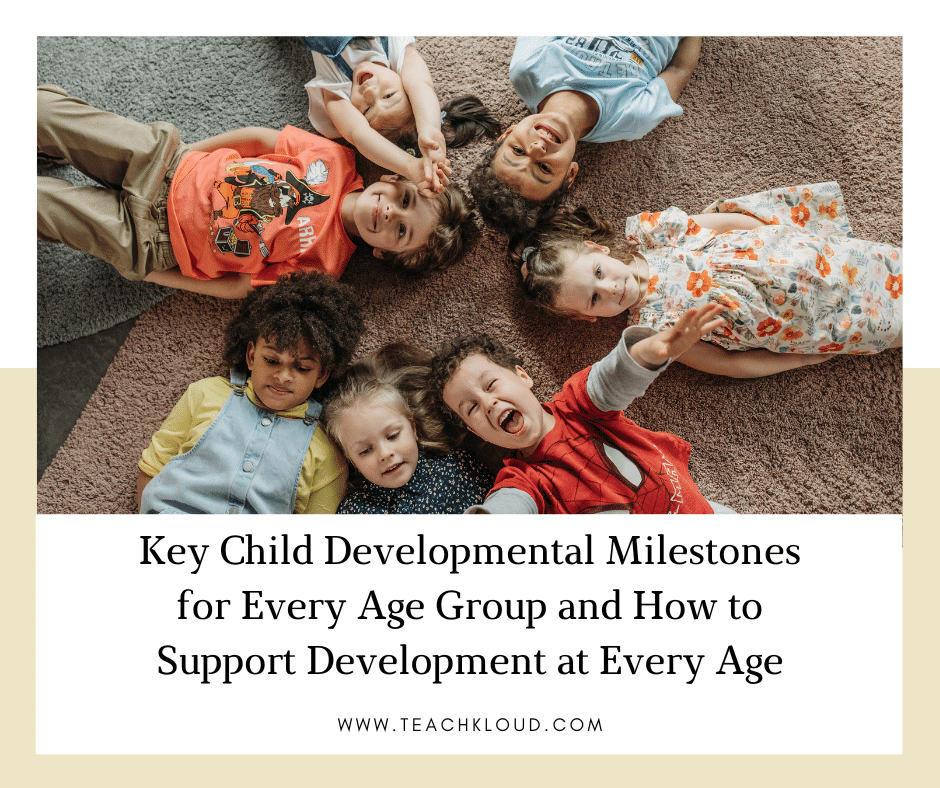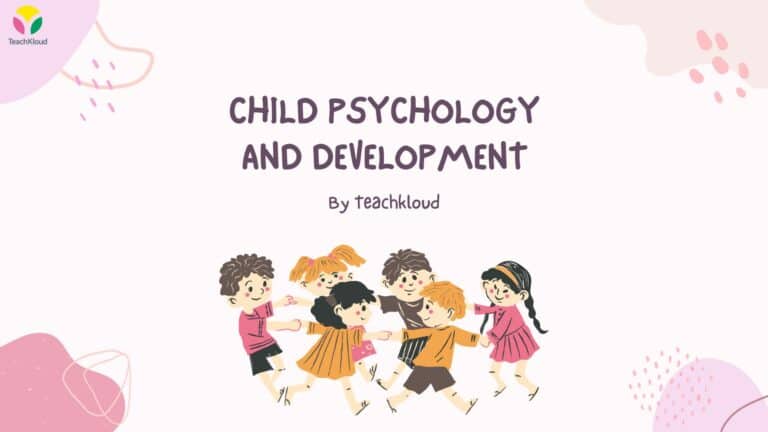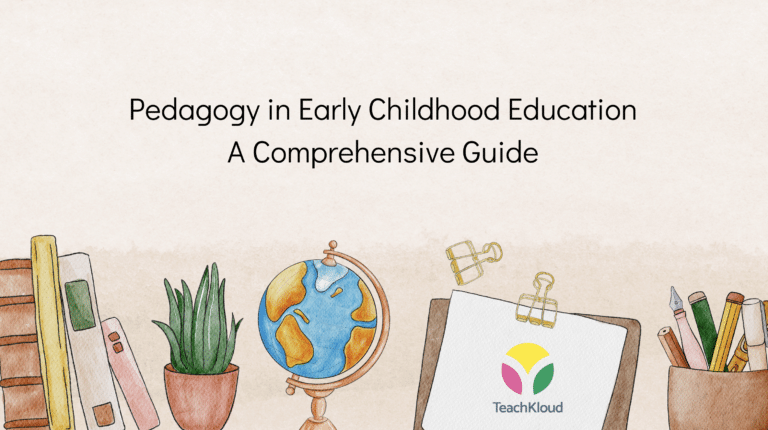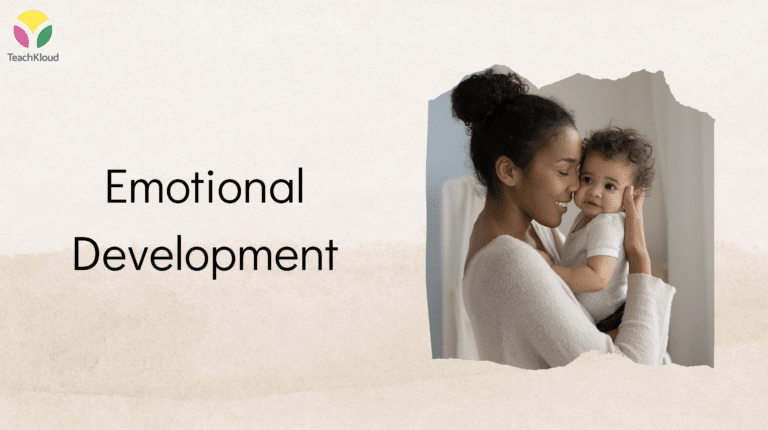As parents and educators, it’s essential to understand and support children’s growth and development, as they grow in order for them to reach their full potential. This guide offers practical strategies on how best to encourage language skills, social abilities, cognitive progressions, and emotional maturity by providing an overview of key developmental milestones, within each age group. At the end of this post, you will have a clear understanding about where exactly your child is at with regards to their journey into adulthood, along with plenty resources that may aid during these crucial years!
Key Takeaways
- Understanding and monitoring developmental milestones is essential to ensure optimal growth in children.
- Milestones vary by age group and sometimes by child, from physical developments for infants to emotional growth for adolescents. Every child is unique. These milestones are for guidance purposes only.
- Parents and educators can support their child’s development through strategies such as fostering language skills, nurturing cognitive abilities, and recognising areas for further attention with a trained professional, with the help of resources like milestone checklists or professional guidance.
Understanding Developmental Milestones
The ages of 9, 18 and 30 months are vital, as these mark crucial phases where children display speedy development. It is critical to monitor a kid’s advancement through developmental milestones for early recognition of any potential delays in growth or progress, which would allow prompt action. Primarily healthcare providers play an integral part when distinguishing between “normative” development and anything else that could hinder the child’s growth. If parents and educators note their infant isn’t reaching desired markers within reasonable timeframes, they may reach out to their doctor for advise but it is important to note that every child is different. Milestones are guidelines and are not fixed or even needed in certain situations – The gestational age at birth should be taken into consideration when looking at milestones, for example, premature babies.
What are Developmental Milestones?
Developmental milestones are indicators that provide an insight into a child’s growth, which include motor skills, language abilities and cognitive development. Physical development such as the acquisition of fine motor skills is also taken into account when evaluating these progressions. The American Academy of Pediatrics has approved standards for determining developmental accomplishments. Parents and educators may use these indicators to understand their child’s development.
Importance of Monitoring Milestones
Parents and educators need to be diligent in their observation of the milestones that are key for detecting signs of potential developmental additional needs, in order to ensure appropriate growth and progress. If there is any suspicion from a parent regarding development, speak to a professional to get advice. Seeking prompt referral into early intervention programs offers significant benefit towards achieving positive outcomes. However, milestones are rough guidelines and every child develops in their own way and time. Making it more complicated is that children develop very quickly. A child that isn’t walking at 18 months might be running by 19. But if the child is only tested at 18 months, they might be identified as not being “on track” (Ruggeri, 2023). Early development can also look different across cultures but most of the research on milestones have been done in Western society. Please take this into consideration, while reading the below. If in doubt, contact a trained professional, such as a doctor or Public Health Nurse.
Milestones by Age Group
Parents and caregivers are in a position to help boost their child’s growth by being aware of the developmental milestones, applicable for various age groups, from infants through adolescents. In this article, we will review all these essential points related to each stage of development.
These ages range from babies and toddlers, right up until pre-schoolers, school going children and teens. Understanding what stages mark typical progression is important when it comes to providing support with regards to physical, as well as mental development, during every one of these phases.
Infants (0-12 months approx.)
Infants experience dramatic changes in their first year of life. These milestones can include motor skills, sensory perception and initial verbal communication such as laughing, babbling or responding to their own name. Parents are key facilitators for promoting infant development through creating a secure yet stimulating environment that encourages language growth, social abilities as well as cognitive aptitudes and emotional health. Rolling over, holding up the head steadily while sitting up independently along with reaching out for objects within reach plus scooting around all form part of this crucial period where nurturing plays an important role in fostering these essential developments.
Toddlers (1-3 years approx.)
Toddlers display considerable progress in many areas of development which comprise motor skills, language growth and social-emotional ability. Motor milestones for toddlers are walking, running as well as jumping while their understanding of speech improves along with communication via words or motions. Toddlers also start showing signs of imaginative play, more independence and increased interaction with others, all part of the necessary developmental achievements to ensure regular child progression plus identify any potential difficulties on time. Monitoring these milestones is essential so that a toddler’s overall abilities can be documented correctly at every stage during childhood.
Preschoolers (3-5 years approx.)
Preschoolers Have improved language, mental and social capacities which ready them for school life and support autonomy. Commonly they can identify colours, shapes as well as numbers up to 10. Know the fundamentals of mathematics, such as counting and be able to write their own name with letters.
Emotionally, this age group is gaining a better control over feelings, while seeking knowledge from peers or adults. For younger children, open-ended learning opportunities, whether that incorporates books, loose parts play or science experiments are a must. See example videos of how educators and parents can incorporate this into the learning environment. Noteworthy, is that during playtime, children will interact with other kids, may need help with sharing and may face separation problems in presence of teachers/students, entering preschool stage. This is completely normal. Initially, due to fearfulness, perhaps caused by shyness at first glance. Please see a full list of milestones by age here!
School-Age Children (6-12 years approx.)
Parents and educators of school-age children should help their kids to develop by providing a nurturing atmosphere, boosting language acquisition and social aptitude, increasing cognitive proficiency as well as furthering emotional maturity. In this age range, youngsters are able to comprehend basic math concepts, read and write proficiently while also starting to distinguish night from day. They have physical milestones such as the capacity for dressing themselves independently. Children continue growing mentally with an advanced understanding of abstract ideas along with logical thought processes allowing them plan ahead whilst handling relationships among peers more effectively too.
Adolescents (13-18 years approx.)
The development of adolescents into adulthood can be encouraged through a secure and encouraging atmosphere, along with clear communication between adults and teens. Parents are able to provide support in cultivating an independent identity by nurturing their adolescent’s physical, mental, emotional growth. This helps foster abstract thinking abilities. Understanding concepts such as morality, identity formation & critical decision making, all important traits in growing up.
Supporting Development at Every Age
Now that we have looked at the various age-related milestones of growth and development, let’s review how parents and educators can assist their child in reaching these goals. Parents and early childhood educators, play a critical role by providing resources to promote language proficiency, help nurture social skills, bolster cognitive abilities and foster emotional well-being for each stage of life. Strategies such as these will aid children in mastering necessary developmental tasks according to their individual ages. Then: parental guidance is an essential factor when it comes time helping children reach or even exceed all appropriate developmental milestones, set out for them from infancy through adolescence and beyond!
Encouraging Language Development
Parents can play a crucial role in boosting their children’s language development. This is because the ability to communicate one’s needs, desires and feelings helps them comprehend what goes on around them. Stimulating this growth could involve activities such as reading stories with your child or discussing events of the day. All these are great ways for parents to grow children’s knowledge base, by introducing new words into everyday dialogue and expanding vocabulary skills. Reading literature together, cultivates kids’ communication abilities through exploration of characters, plots & conversations regarding related themes, enriching overall literacy levels!
Fostering Social Skills
Children require excellent social abilities for mental health and successful outcomes in life. Parents can help foster interactions between their children by engaging with them through activities like reading, playing (especially for young children) or conversing, to demonstrating empathy towards others, as part of daily life. Parents and educators should discuss emotions and prompt the child to understand how other people feel too. Check our our webinar on helping children cope with big emotions here. Using social stories such as Empathy Is Your Superpower by Cori Bussolari can be fun ways to introduce empathy concepts. To encourage appropriate behaviour from a young age, it is necessary that parental role models show good habits and proper reinforcement along with clarified expectations are set out clearly beforehand. High quality preschool has been shown to be an excellent way to support children in fostering social, emotional and cognitive skills, as they have many opportunities to practice these with their friends and as part of the preschool daily routine.
Nurturing Cognitive Abilities
Parents and early childhood educators have the power to support and encourage their children’s cognitive abilities by providing them with learning experiences, activities, or materials that stimulate problem-solving and creativity. Play can be a great way to do this since open-ended items such as puzzles or building blocks, allow young minds to explore in imaginative ways. Educational games like board games promote logical thinking which facilitates these skillsets developmentally. Lastly, books are also valuable tools used for practicing academic related pursuits, such as reading comprehension, writing proficiency or mathematics concepts. For younger children, open-ended learning opportunities, whether that incorporates books, loose parts play or science experiments are a must. See example videos of how educators and parents can incorporate this into the learning environment. All of which work together towards establishing well rounded growth through acquired knowledge and experiences.
Promoting Emotional Growth
Creating a secure environment that allows for expression, as well as the teaching of strategies on how they can handle emotions, are key factors in encouraging emotional growth. Offering positive feedback and guiding them into understanding their feelings better, will make this possible too. To promote psychological progress among kids, providing comfort when needed along with strong motivation likewise plays important roles. Watch our quick video packed with strategies on doing exactly this here.
Tools and Resources for Tracking Development
Keeping an eye on a child’s progress can be made simpler with the help of multiple instruments and resources. Using milestone checklists, mobile apps for educators like TeachKloud and getting professional assistance, provide parents and educators an avenue to monitor their kid’s growth while pinpointing any issue or delays that may need attention. However, as noted several times in this article, every child is unique and develops at their own pace.
This segment will focus on how tools such as checklist guidelines, applications for phones and advice from experts, are advantageous when tracking a young one’s development.
Milestone Checklists
Milestone checklists provide an extensive overview of developmental stages that are appropriate for the age and can be used to identify any issues requiring Examination. The importance of tracking milestones is in having access to early intervention which has a positive impact on helping children reach their fullest potential as they grow up. Examples include CDC Milestone Tracker, WHO Child Development Milestones and American Academy’s Ages & Stages Questionnaires – all providing practical aid when it comes to keeping tabs on your child’s progress developmentally speaking.
Mobile Apps
Parents of young babies can now track the development of their child with various mobile apps. Through these applications, such as BabySparks, Glow Baby and Kinedu to name a few, parents are able to monitor progress in reaching milestones set for each stage of growth. They have access to reminders when it’s time for important appointments concerning developmental stages and receive tailored advice from experienced experts, if needed.
Professional Support
Parents can get the help and guidance they need to ensure their child’s development progresses optimally from a variety of healthcare professionals, such as paediatricians, therapists or other relevant experts. These specialists can offer tips on how best to support their kid’s growth while also being able to monitor it through assessment and providing resources whenever necessary.
Addressing Developmental Additional Needs
In order to maximise a child’s ability, it is important for parents to be aware of and respond quickly when signs of developmental or additional needs are noticed. Early intervention in these cases can make all the difference and enable the young one reach their full potential. By understanding what constitute as indicators of possible additional needs, parents should provide adequate assistance and support so that they may aid them on this journey towards success. It is key that mothers or fathers take an active role during this stage. Intervening immediately will allow those involved with development – such as practitioners- properly assesses each case thoroughly..
Signs of Additional Needs
Age-appropriate milestones may not be met by some individuals, indicating the possibility of a developmental delay. Such additional needs could manifest in cognitive, language, motor or social-emotional realms and can vary accordingly. For instance, additional needs impacting fine/gross motor skills, speech impediments, challenges to cognition processes or difficulties concerning emotions. Consequently, recognising these potential hindrances is essential for successful progress towards age -relevant capabilities and abilities
Summary
As a parent, it is important to understand and provide support for the different developmental milestones your child will experience during their life. By familiarizing yourself with age-specific stages of development, utilizing tools and resources to track progress, as well as engaging in activities that encourage growth – you can ensure your youngster reaches all potentials. Also, don’t forget about early intervention if any perceived additional needs are noticed, this kind of timely attention plays an invaluable role in providing comfort and courage throughout various challenges associated with growing up!









